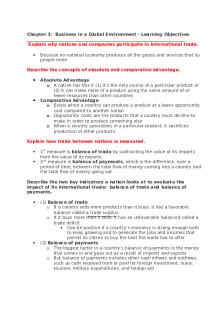Tjelveit - Chapter 3 - Notes PDF

| Title | Tjelveit - Chapter 3 - Notes |
|---|---|
| Author | PSY in DMajor |
| Course | Ethics Prof Orient. & Legal |
| Institution | Regent University |
| Pages | 4 |
| File Size | 79.7 KB |
| File Type | |
| Total Downloads | 57 |
| Total Views | 139 |
Summary
Summary of a highlighted chapter in the course. ...
Description
Tjeltveit – Chapter 3 -
-
-
-
-
Who is an ethicist? An ethicist is someone who reflects on, has convictions about, and works to influences others about ethical issues. A moralist is someone who tries to impose their values on others. They want to regulate the morale lives of another person. Very narrow and in an authoritarian way. Am I functioning as a moralist or an ethicist? What does an ethicist do? Others may want to avoid discussions of morality all together, while Tjelteit identifies that it is unescapable. How does an ethicist influence others? Is going to think well about ethical issues. As a therapist you influence ethical views and behaviors by functioning in different ways. You can teach people to think well about ethical issues. Not telling them what to do like a moralist but teaching them about the options in front of them. Other times you are a consultant, who offers recommendations. Or a coach who is equipping a client to reach their agreed upon goals. Functioning at their highest capacity. An advocate, who advocates reasons for certain ethical/ morale views. (i.e. advocating that a father stays in the region after the divorce for his children.) Not moralistically bullying. Clients can hear bullying though even when you don’t intend it. Be careful. A role model: how we relate to one another, multidirectional partiality. In a family therapy situation, you a partial to the individual groups (parents, children) in how to engage each other. Modeling. The mid-wife – you assist the client in what you believe to be the natural process.
Application of the Ethics Code
-
To whom does the Ethics Code apply? To APA members and student affiliates
To what does the Ethics Code apply? Activities, persons, settings, communications contexts, research participants, hospitals, courts, government agencies, ect. – You should be mindful of how you communicate. APA Ethics Committee -
[http://www.apa.org/ethics/rules.html] Ethics complaints (members or nonmembers) can be dismissed -
Most come from clients or client’s family members.
-
Some come from other colleagues. Few from students, supervisees, ect.
Receipt of a charge letter - Informing you that this has happened. You have to respond. Sanctions - Supervision requirement - Education, Training, or Tutorial Requirements - Evaluation and/or treatment requirements - Probation Additional requirements - Cease and desist order - Other corrective actions A continuum of infractions - In any possible violation, there is always a continuum of minor and major infracions. - Levels of ethical violations – on .pptx slide 13
Whether to pursue an informal resolution What if it’s not amenable to an informal resolution? - The credibility and seriousness of the allegation. - The seriousness of future violations Avoiding frivolous complaints: Key questions - Can harm to the public or profession be identified? - Is the ethical violation clear or ambiguous? - Would a reasonable colleague suppose that an ethical violation might exist? - Is there “evidence” of an ethical violation or the absence of an ethical violation?
Competence - Standards, licensing, credentials, and area of practice. Standards on Competence 1. 2. 3. 4. 5. 6. 7.
Licensing, Credentialing & Areas of Practice Boundaries of Competence Providing Services in Emergencies Maintaining Competence Basis for Scientific and Professional Judgments Delegation of Work to Others Personal Problems and Conflicts
Licensing, Credentialing and Areas of Practice 1. 2. 3. 4.
Professional Identity Relevant Coursework Internship Licensing Exam
Credentials 1. Primary credentials 2. Secondary credentials 3. Tertiary credentials
Boundaries of Competence Psychologists must (1) be familiar with professional and scientific knowledge, (2) have appropriate skills, and (3) know when to refrain or refer
Providing Services in Emergencies • • • •
Historical precedent: Oklahoma City bombing and 9/11 attacks In emergencies… psychologists may provide services even without the necessary training To ensure that services are not denied – then discontinue after emergency ends or when appropriate services are available (ES 2.02) It would include traveling to a state in which you are not licensed. Maybe?
Maintaining Competence - Half of what we are learning will be obsolete in 10-12 years. - Continuing education is very important and mandated in most states. - A need to maintain your health. - Personal health problems, mental/ physical, do interfere with you service. - Watch for angry outbursts, apathy, ect. - You have to creatively nurture you relationships and mental health. Basis for Scientific and Professional Judgments - ES 2.04 - We should know, various novel approaches, and integrative interventions. But are they established in general principles? You’re doing CBT and being religiously accommodative to the model.
Delegation of Work to Others - Avoid delegating to those who have a multiple relationship with the client being served - If you delegate responsibilities make sure you take responsibility for what’s taking place in the delegation. - Take responsible steps in situations in which you have to delegate to those in a chain of command in which you express concerns over the issues of the person you delegate to. Personal Problems and Conflicts - This is one of the few preventative standards. - ES 2.06 - You must take appropriate measures to work through your issue. (i.e. you’re going through a divorce.)...
Similar Free PDFs

Tjelveit - Chapter 3 - Notes
- 4 Pages

Chapter 3 - Lecture notes 3
- 1 Pages

Chapter 3 - Lecture notes 3
- 30 Pages

Chapter 3 - Lecture notes 3
- 6 Pages

Chapter 3 - Lecture notes 3
- 6 Pages

Chapter 3 - Lecture notes 3
- 45 Pages

Chapter 3 - Lecture notes 3
- 4 Pages

Chapter 3 - Lecture notes 3
- 4 Pages

Chapter 3 - Lecture notes 3
- 3 Pages

Chapter 3 - Lecture notes 3
- 3 Pages

Chapter 3 - Lecture notes 3
- 24 Pages

Chapter 3 - Lecture notes 3
- 5 Pages

Chapter 3 - Lecture notes 3
- 4 Pages

Psychology Notes- chapter 3
- 3 Pages

Chapter 3 Notes
- 2 Pages

Physics Chapter 3 Notes
- 2 Pages
Popular Institutions
- Tinajero National High School - Annex
- Politeknik Caltex Riau
- Yokohama City University
- SGT University
- University of Al-Qadisiyah
- Divine Word College of Vigan
- Techniek College Rotterdam
- Universidade de Santiago
- Universiti Teknologi MARA Cawangan Johor Kampus Pasir Gudang
- Poltekkes Kemenkes Yogyakarta
- Baguio City National High School
- Colegio san marcos
- preparatoria uno
- Centro de Bachillerato Tecnológico Industrial y de Servicios No. 107
- Dalian Maritime University
- Quang Trung Secondary School
- Colegio Tecnológico en Informática
- Corporación Regional de Educación Superior
- Grupo CEDVA
- Dar Al Uloom University
- Centro de Estudios Preuniversitarios de la Universidad Nacional de Ingeniería
- 上智大学
- Aakash International School, Nuna Majara
- San Felipe Neri Catholic School
- Kang Chiao International School - New Taipei City
- Misamis Occidental National High School
- Institución Educativa Escuela Normal Juan Ladrilleros
- Kolehiyo ng Pantukan
- Batanes State College
- Instituto Continental
- Sekolah Menengah Kejuruan Kesehatan Kaltara (Tarakan)
- Colegio de La Inmaculada Concepcion - Cebu